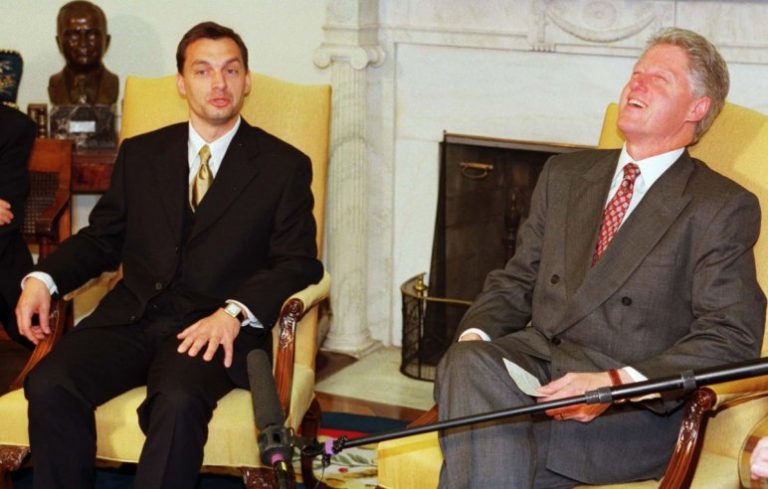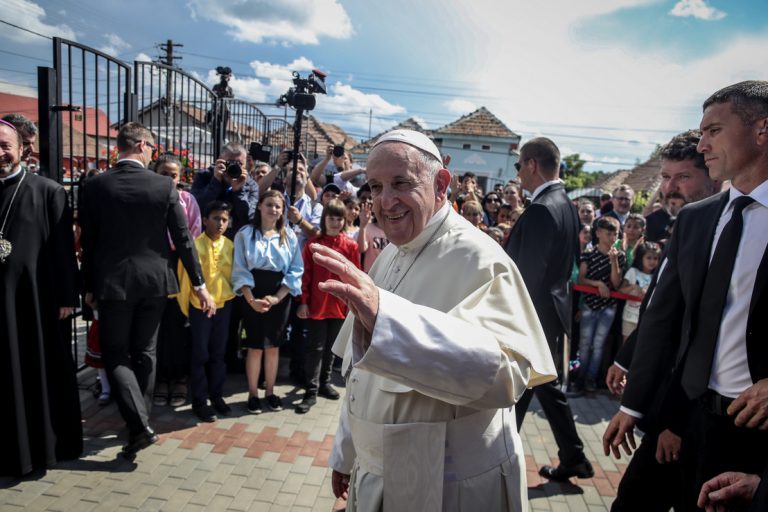Hungary Monthly Digest: “People Have a Lot of Respect for This Prime Minister”5 min read
– On May 13th, Hungarian Prime Minister Viktor Orbán sat down with US President Donald Trump for talks on security and trade. The meeting allegedly took 45 minutes in total, with private discussions between the two presidents amounting to less than 20 minutes. Still, the meeting appears to have been fruitful as the two presidents displayed mutual admiration and respect for each other, with Trump stating after the meeting that “People have a lot of respect for this Prime Minister”.Trump also praised Orbán as a defender of Christendom and together the two leaders announced that the United States and Hungary would serve as partners in assisting persecuted Christians, around the world as well as in resisting migration together.

A young Viktor Orbán with former US President Bill Clinton in 1998. Image source
Orbán’s meeting with an American President was his first in 21 years. In 1998, Orbán, then only 35 years old and newly elected as the Prime Minister of Hungary, met with Bill Clinton in the Oval Office. As reported by Hungarian Free Press, it is interesting to note while a majority of Hungarians feel positive towards Americans, the political right is quite anti-American. This stems from the belief that Hungary was betrayed by the US in 1956 but also from a sense that Hungarian culture is superior to American. In politics, it is interesting to note that even though Orbán is one of our times fiercest critics of Islam, he is on more than friendly terms with the Iranian regime, itself a stated archenemy of the US and whose current regime President Trump is apparently putting a lot of effort into bringing down.
– On May 14th, Our Homeland, a Hungarian far right party, announced the formation of a paramilitary group called the National League. The group stated that they will focus on “self-defense” and the “preservation of traditions” as well as providing educational programs and training for youth in Hungary. Our Homeland, originally formed by dissidents of the far-right Jobbik party participated in the European Elections on May 26th. Unsurprisingly, they were left without a seat in the European Parliament, scoring only 3.33% of the popular vote.
– The results of the European Parliamentary Elections on May 26th showed that even though ruling party Fidesz is currently suspended from the center-right European People’s Party coalition, they won the popular vote with 52.33% and took 13 seats. Upon receiving announcements of the results, Prime Minister Viktor Orban stated that the Hungarian people now had granted him the right to do three things: “stop migration in Europe, defend the Europe of nations and defend Europe’s Christian culture.”
While the fact that Fidesz became the winners of this year’s election didn’t shock anyone, the fact that the Democratic Coalition (currently belonging to the Progressive Alliance of Socialists and Democrats) took four seats, making them the second most powerful party in Hungary, was way more surprising. Another opposition party, Momentum (belonging to the ALDE in the EP), not only scored high in Budapest but reached a breakthrough, got two seats, entering the European Parliament for the first time. The biggest losers were the Socialists and far-right Jobbik, who only got one seat each.
– On May 29th a cruise ship hit a tourist boat in the Danube , killing 28 people. It has been deemed the worst crash on the river in more the 50 years. 11 people are still officially missing and presumed to be dead. Most of those aboard the tourist boat were from South Korea. The captain, a 64-year-old Ukrainian, has been arrested but denies any wrongdoing.
In light of the accident, local politicians have called to revise cruising regulations and to review the technical conditions of Hungarian tourist boats. The Danube is heavily trafficked and even though the tourist ship was well-maintained, it sunk within seconds. Opposition media have pointed out that due to the fact that the operators of the cruise ship (a Switzerland-based boat company called Viking) involved in the accident owns part of Mahart Passnave, a company that owns and operates Budapest’s river harbors together with the Hungarian government, conflict of interest is suspected to occur and “might influence government regulations related to the Danube traffic”.

Pope Francis visited Romania at the end of May. Romania is inhabited by about half a million Hungarians belonging to the Roman Catholic Church. Image source
– At the end of May, Pope Francis visited Romania and Șumuleu Ciuc in eastern Transylvania. Being a place for annual Roman Catholic Pilgrimage, the open-air sermon conducted there on May 31st was visited by the Hungarian President János Áder and some other Hungarian government officials. Currently, 4 % of Romania’s population belong to the Catholic church, about half a million of whom are Hungarian, along with 300 000 Romanians. A majority of Romanians belong to the Greek Orthodox Church (80%). According to an article by the Hungarian Spectrum, little attention has been paid by the Vatican to national minorities in this region, which is why the event was deemed an historic one. The Pope reportedly “didn’t speak about nations but about people, not about religion, but about faith”, conveying a much-needed message in a region that, due to historic events and ethnic divisions, has caused continuous strains between the two countries.
During his visit to Romania, the Pope met with representatives of the country’s Roma community (which makes up 8% of the population) offering an apology to Roma people for “all those times in history when we have discriminated, mistreated or looked askance at you”.
This (historic) event was barely covered by Hungarian media and the few articles highlighting the event was either hateful and racist or followed by comments on the same theme.
Main sources: Hungarian Free Press (EN), BBC (EN), Hungarian Spectrum (EN)


